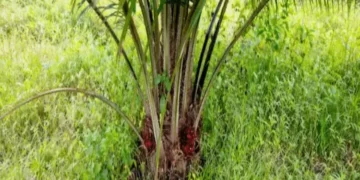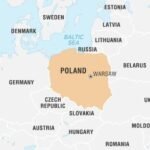Poland will temporarily stop all imports of Ukrainian grains, in an effort to ease the impact of plummeting prices on Polish farmers.
- Have you read?
- VACANCY: Transcorp is recruiting into several positions
- List of Dividends announced in 2023, qualification and payment dates
Ukraine and Poland jointly agreed to halt the shipment of grains from Ukraine to Poland on Friday, after the cheap produce from war-torn Ukraine flooded Eastern European markets.
The Polish Agriculture Minister Robert Telus made the announcement after meeting his Ukrainian counterpart. Kiev has agreed to limit and for now halt exports to Poland,” Telus told reporters. He went on to add that “transit will be allowed but will be closely monitored in both countries. so that Ukraine’s grain doesn’t stay in Poland.”
Following the “special military operation” by Russian forces in one of the world’s largest agricultural producers, Ukraine was forced to divert around half of its exports from the blocked Black Sea ports into Poland, Hungary, Romania and other border countries.
The European Union facilitated this by suspending customs duties on all agricultural produce from Ukraine for one year, starting in May 2022, in a bid to support Ukraine’s economy, and ensure that its exports could reach global markets.
Most of the Ukrainian produce that were diverted to Eastern EU nations instead of transiting through these countries flooded their local markets. The glut of cheap grain left EU producers struggling against what they view as unfair competition.
Earlier this week, Telus’ predecessor, Henryk Kowalczyk, resigned amid mass farmers’ protests over the issue. Romania and Bulgaria have seen similar waves of unrest, with farmers staging demonstrations in the capitals and blocking border crossings.
“The situation is difficult for both Ukrainian and Polish farmers. We all understand who is to blame, but we have to solve this problem. The Ukrainian side will refrain from exporting wheat, corn, rapeseed and sunflower to Poland until the new season,” Solskyi said, referring to this summer’s harvest.
Solskyi added that the two sides would meet again in the coming days to ensure smooth transit of grain intended for other countries.
“We are counting on the most constructive position of the Polish side regarding the transit of Ukrainian grain to Polish ports and ports of other EU countries,” he said.
Telus took office on Thursday, a day after his predecessor Henryk Kowalczyk resigned from his post, amid rising anger among Polish farmers over the glut of cheap Ukrainian crops.
Farmers in Poland, Hungary, Romania, Slovakia and Bulgaria have suffered substantial losses due to the surge in imports of Ukrainian grain that was initially destined for Africa and the Middle East, but instead has been stuck in Eastern Europe.
On Friday, thousands of Bulgarian and Romanian farmers blocked border crossings into Ukraine, in protest against the influx of supplies.
Polish government spokesman Piotr Muller pledged on Friday that in the coming days, authorities would develop “mechanisms that will stop such grain exports that have led to a destabilization on the Polish food market.”
Last month, the prime ministers of five EU states including Poland wrote to European Commission President Ursula von der Leyen demanding action on Ukrainian agricultural imports, and urging her to reintroduce tariffs to prevent a further influx of Ukrainian grain.
Nnamdi Maduakor is a Writer, Investor and Entrepreneur
























































